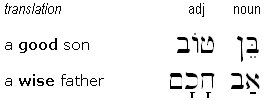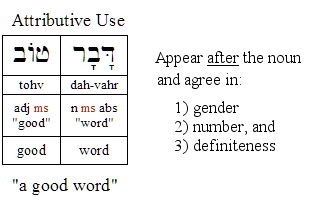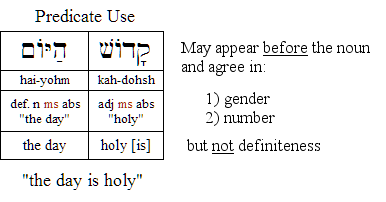|
Adjective Properties
An adjective is a word used to "modify" or "qualify" the meaning of a noun:
a big man
a holy people
a great nation
In the example phrases above, the words big, holy, and great are all adjectives.
In English, adjectives appear before the noun they modify, but in Hebrew adjectives often appear after the noun they modify:

Like the nouns they modify, adjectives have certain properties:
- Gender
Gender is a property that indicates the sex of the referent (masculine or feminine). In Hebrew, a masculine noun requires a masculine adjective, and a feminine noun requires a feminine adjective (i.e., an adjective must agree with its noun in gender). Note that the gender of an adjective does not change its meaning, only its form.
- Number
Number is the property that indicates whether one or more than one object is referenced when using the word. Hebrew has singular nouns (one object), plural nouns (more than one object), and dual nouns (a pair of objects). An adjective must agree with its noun in number: Plural nouns require plural adjectives, and singular nouns require singular adjectives. Note that adjectives that are plural in form are singular in translation (for example tall boys; the word tall in Hebrew would appear in the plural form but would be translated as a singular term).
- Definiteness
Nouns can either be definite (either by taking the definite article or by being a proper noun) or indefinite. Attributive adjectives must agree with their nouns in definiteness, and therefore may appear with the article.
Since there are two possible genders and two possible numbers, there are four forms for every adjective, to agree with the four possible forms of nouns (adjectives do not have a "dual" form as some nouns but use the plural form). Happily, the endings for adjectives parallel the endings you have already learned for nouns, so learning the inflections for adjectives is relatively easy. On the other hand, since Hebrew adjectives share the same endings as nouns, they can be difficult to recognize at times. Moreover adjectives can function substantively, that is, as "adjectival nouns."
Note: The lexical form of an adjective is always the masculine singular form (this is unlike nouns that can be either masculine or feminine).
Adjective Usage
There are four basic ways adjectives are used:
- Attribute Usage
Adjectives that directly modify a noun are called "attributive" because they attribute a certain characteristic to a noun. For example, in the phrase "tall boy," the adjective "tall" is being attributed to the word "boy." In Hebrew, attribute adjectives appear directly after the noun and agree in gender, number, and definiteness.

- Predicate Usage
When you say "the boy is tall," you are predicating or ascribing the quality "tall" to the subject, "boy." Predicate adjectives use the word "is" with the adjective to form the predicate of a complete clause (subject+verb). In Hebrew, predicate adjectives appear before the noun and agree in gender and number (but not definiteness). Note that predicate adjectives never take the definite article.

- Substantive Usage
An adjective can stand alone and function as a noun. For example, you could say "the tall are boys," the word "tall" could mean "tall ones." Substantive adjectives always have a definite article (i.e., they are definite in form).

- Comparative Usage
Adjectives may be used to make comparative statements. In English, we do this by adding -er or -est to the end of an adjective (round, rounder, roundest). In Hebrew, a construction with a preposition "from" (min) is used to make comparatives.

Note: Compared to some other languages, Hebrew uses very few adjectives, in part because nouns in the construct state are often used in place of adjectives, and because Hebrew often uses participles in place of adjectives.
<< Return
|
|








